#in search of antigone's false story structure
Text
A puzzle piece of Antigone's Diagram–Someone cool this time
Goheen, Robert F. (Robert Francis). 1951. The Imagery of Sophocles’ Antigone : A Study of Poetic Language and Structure / by Robert F. Goheen. Princeton: Princeton University Press.
Went all the way to a university library to look for the wrong diagram for Antigone.
The closest I got was this:
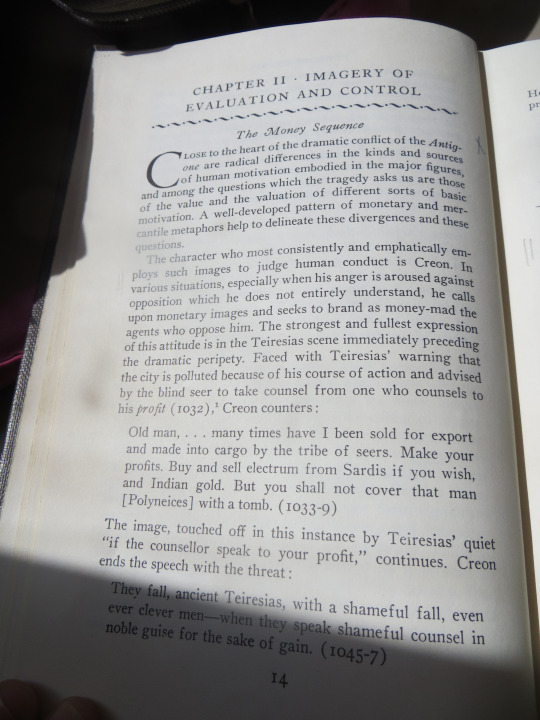

"Unlike the modern opera to which it is often compared, Greek Tragedy did not subordinate plot and character–or if you wil, drama–to music and the dance. This is clear from the extant tragedies. In general, the plot or conflict of agents in action is, as Aristotle observed, the central structural feature And in every extant Greek tragedy the language, or element of diction, is highly and skillfully developed element. To some extent, perhaps this is a happy accident. A large open-air theater, heavy costuming, and masks imposed limitations on physical action ad facial expression which by modern standards must seem severe.

...The total structure of the tragedy has therefore two significant dimension: a horizontal (time) dimension and a vertical (meaning, value) dimension is what the tragedy on the whole means. This, too, starts with the plot—the sequence of actions as symbolizing something or representing certain universals–but it includes also the choral and poetic components, which contribute to total content kinds of perception and modes of meaning that are to some extent over and above the specific actions of the character.
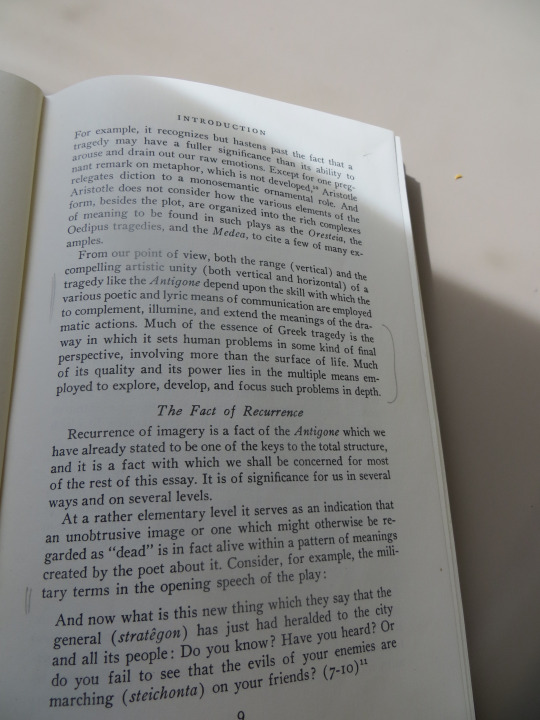
So he put conflict and continued character at the center of the diagram. Which is different from the previous diagram I posted where emotion was argued for. There are a few loose references to Freytag's work, but no credit is given. You will understand why if you read his profile and then remember how much of an AH Freytag was.
This is not the "Big" gotcha moment I was hoping for, but given the timing, and how Antigone was played out during history ad earlier attempts to describe Antigone:
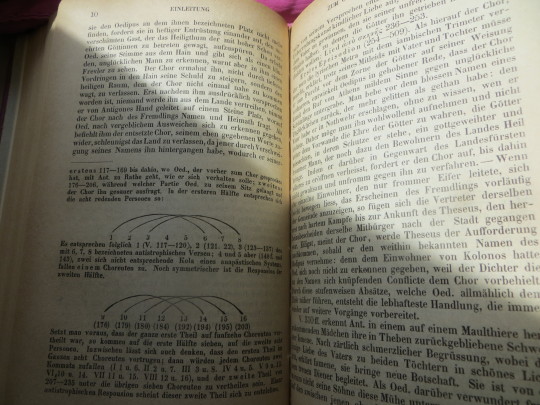
Such as this earlier German look at Antigone, I think one can say the scholarship split into two camps somewhere down the line.
One is the way they looked at Antigone this way:

This is from an early 1810-ish's version of looking at Antigone, predates Freytag, where the Greek is given.
And the other is more like Goheen's way of analyzing the text which is in contemporary terminology, but often with none of the credits for that idea.
There are more conservative looks at Antigone, which I glanced over while I was there, where the person goes by Stasimon, for example this study of Antigone: https://www.jstor.org/stable/44276322?read-now=1#page_scan_tab_contents
which is in French, but you kinda get the idea.
So instead of going over it in contemporary terms, it goes over it in terms that Aristotle would have gone over it and see it—a lot of the theses ran towards trying to see it as how Aristotle and Sophocles would have seen the structure. Chorus, morals, putting the order in the way Aristotle would have wanted.
There are somewhat the people in the middle, who don't discuss the structure at all, but keep emphasizing character as the most important thing.
Antigone by Jean Anouilh
The Theban plays translated by Robert Fagles (1984)
Both of these do this, though if you were paying attention to what Aristotle actually said, he didn't say that character was the most important, but that character was far less important than morals.
And then you have people on Goheen's side of things, where they take modern terms, ignore what Aristotle actually said, and try for basically readercism minus a lot of Historicism.
But you can see in those paragraphs I quoted for you shades of Freytag. "Can't move about the stage." was one of his assertions, though it was about the wooden sandals. And when I looked up Goheen's sources, he didn't source that opinion anywhere. His citation 7 leads to a dead end. He cites a entire book, but it's not about the staging...?
Freytag's assertions about character coming first, is also something he stated.
The diagram is also Freytag-ish, so why would Goheen not cite Freytag? Do you remember when Freytag called "Hindoos" (His phrasing, not mine) "Substandard as a race who couldn't make theater." ideas...
And if you read Goheen's bio, that had to get him in a twist.
I can also feel Selden Lincoln Whitcomb maybe via Rowe?
The shadow of Percy Lubbock is in this essay too, but it's late enough that maybe Goheen didn't know. Alice Guy Blaché was erased in her own lifetime.
About Robert Goheen:
Born in India. Both parents were likely? white. Maybe. It gets dicey with imperialism. But the wikipedia article said both of his parents were missonaries.
Fought for Black Civil rights in education. Super awesome as you can get. He faced steep opposition to his support of Black civil rights, but he still fought for them to be included in the college.
16th President of Princeton.
Conclusion
What I've learned so far is that you can like someone's ideas tremendously, but still hate their guts, but you really, really should cite them anyway and do a minor take down instead of all these sideways mentions. OK, it's not very academic to call Freytag a royal A Asshole that loves Fascism, even if that's very easy to argue, but also, I don't think it's a good idea to take the person's ideas and not give them credit. One can like an idea within the scope of a person but still think they are scum. Given the political leanings of Goheen and that I can remember some of the assertions Freytag made, yeah, I kinda feel like Goheen liked the idea of a plot structure, but hated the originator was really effing racist towards a country he'd spent his formative years in (maybe Third culture kid??)
And while I understand the lack of mention of Freytag, kinda purposefully getting Aristotle wrong on character, conflict, and so on kinda is a bit strange to me. You can point to the value shift, point to say, Percy Lubbock, and say, you wish to look at it from a Lubbock PoV, but maybe Lubbock being gay was against his moral code as the son of missionaries? (I hope not, but you never know). How did conflict and this readercism attitude creep in otherwise?
So cool figure. Maybe a puzzle piece, but CITE YOUR SOURCES NO MATTER WHAT. Even if you hate their guts. You can disavow the rest if need be and re-argue it from a different angle that's not based on say, the genocide of Polish people (Freytag).
One can say you like the upholding of the middle class and lower class in fascism, but still hate fascism and argue against it.
But I suppose plagiarism is kinda a Professor thing–or more professors in this long, long project have plagiarized than any other group. TT Sometimes you teach it, but you don't live it.
I got frustrated so much that I ended up flipping through every Antigone book I could find at the uni library. Not in any of them. TT I think I have enough to debunk the diagram, though.
#story theory#story structure#in search of antigone's false story structure#Robert f. goheen#princeton#Geeze finally a figure that's not a major ah#what's with professors in this project and plagiarism?
0 notes
Text
In Search of Antigone’s Plot structure (the fake one.)
Assertion that Antigone’s plot structure was conflict:
Sophocles' Ajax and Sophoclean Plot Construction
James Tyler The American Journal of Philology, Vol. 95, No. 1 (Spring, 1974), pp. 24-42 (19 pages)https://doi.org/10.2307/293816 p 40
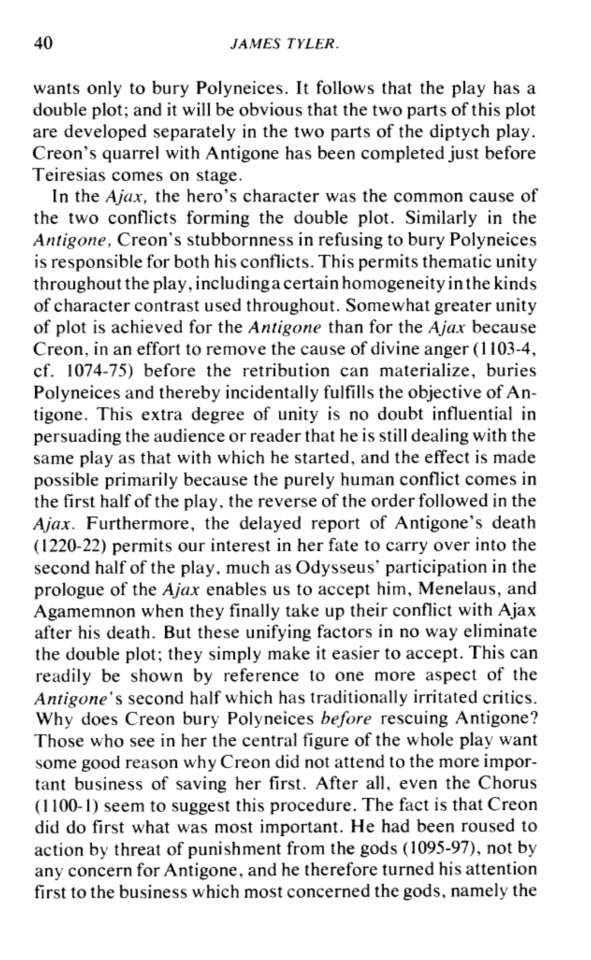
He’s focused on conflict, as we established came from Percy Lubbock, 1921, though amplified, but not given credit by Barthes in the 1960′s, translated in the 1970′s-1980′s into English. (lol I’ve memorized it)
William G. McCollom College English, Vol. 19, No. 2 (Nov., 1957), pp. 51-56 (6 pages)https://doi.org/10.2307/372701
The whole paper manages to misunderstand Sophocles by putting it towards character being the most important, and that’s second to last on Aristotle’s list. He gets one part right.
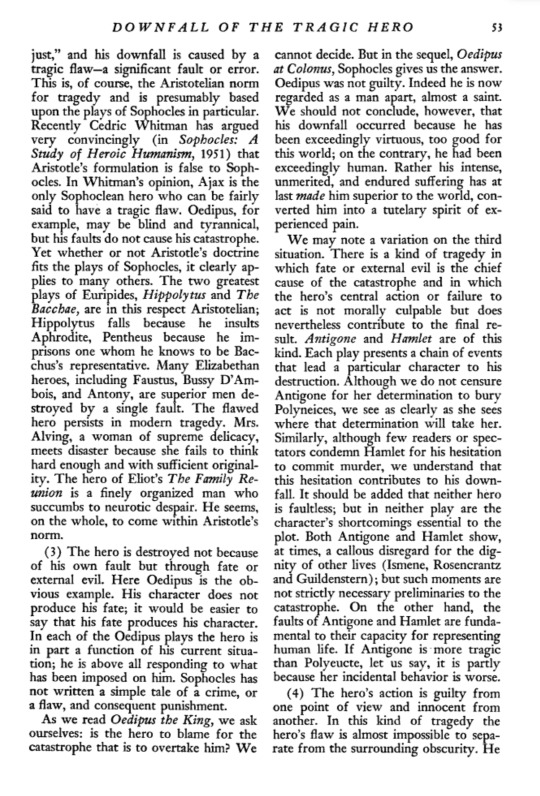

He gets part 3 right, that Aristotle said everything was left up to fate, But four on tragic flaw isn’t something that existed in that time period in the same way. The whole point wasn’t character-led. It was events create character. Fate informs who the character is and the chorus is the most important part. The action comes directly from the fate of the characters according to Aristotle and there should be a singular long plot that’s continuous. The whole point was negative reinforcement to make people feel bad about themselves so they would morally behave. Layered plots are later in history from what I dug up, mainly coming in Elizabethan plays for Europe.
Not all hope is lost:
Someone who actually paid attention to the original story structure: "Why Should I Dance?": Choral Self-Referentiality in Greek Tragedy Albert Henrichs Arion: A Journal of Humanities and the Classics, Third Series, Vol. 3, No. 1, The Chorus in Greek Tragedy and Culture, One (Fall, 1994 - Winter, 1995), pp. 56-111 (56 pages)
And says things like Chorus and Stasimon. Someone who actually read Poetics through. OMG. This is 1995, though, and looks like someone is trying to do a correction to the literature, but failed.
I went through most of JSTOR and still couldn’t find the diagram. I also asked archive if there was a way to search their database by images or if they would invent one for the system and they said no. (flat no, wouldn’t even consider it). The NYPL could only find an earlier one through google books. So I’m down to limiting the date range and then plundering the Library of Congress or NYC library, since the large local library doesn’t have books before 1990′s, I think. Really trying to find the origin of the bad diagram is hard with no name, but an approximate date.
But I think in combination with the whole false diagramming from the 1920′s-1930′s, I’m getting closer. I still think it’s the 1970′s-1980′s that the understanding of the plot structure turned and changed to the wrong diagram that was drawn on the board for me because academics didn’t check their work before being published and went with the grapevine error instead of reading the full original source.
I think this shows problems in academia very well--because of the time pressure people often rely on other academics, who then cite other academics, but if they never read the original source material and tangle with it and find the errors within the larger context, then it causes issues with wrong information being diluted and passed down. Because no one has paused to ask if Gustav Freytag was a pre-Nazi by celebrating The Ring before and rather say things like, “it was the times.” and in putting down PoCs and women what that implies about later structuralists. But I think academia needs to do this work and not just conveniently cut out 95% of the work and focus only on the diagram. There’s clear context to what Freytag is saying.
And so it’s true with everyone else I’ve read so far. Stop cherry picking. You might miss something.
#antigone#plot structure#scholarship#the problems with scholarship#in search of antigone's false story structure#problems with academia#academic grapevine sucks
0 notes